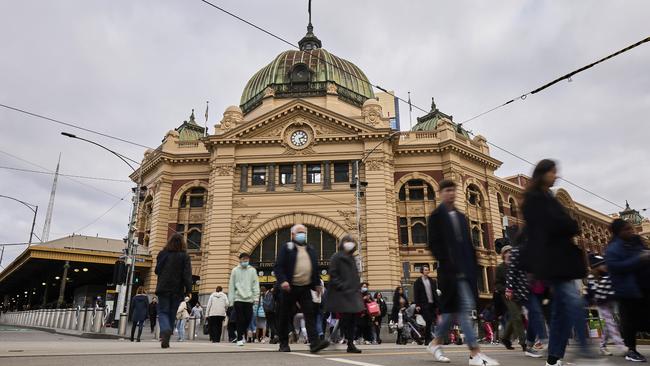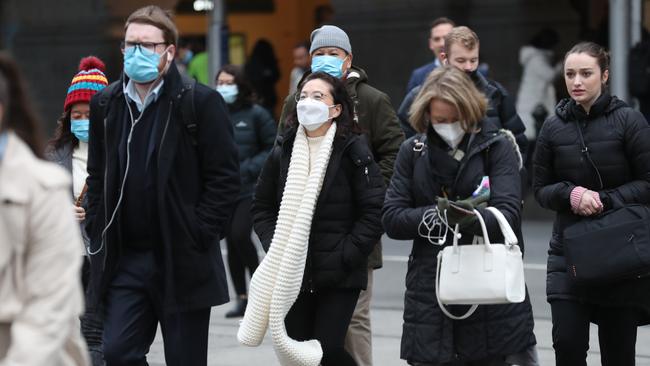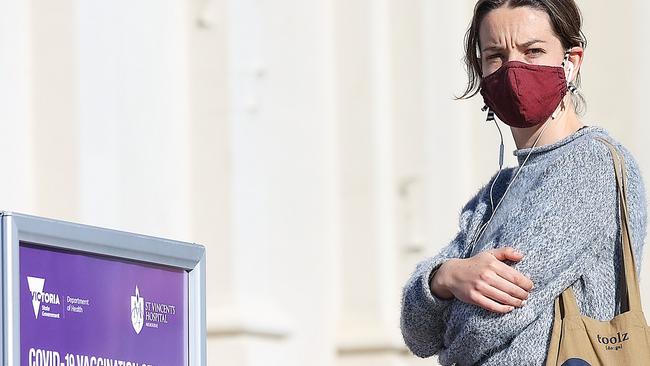More details of Victorian hospitals’ Covid winter response revealed
A virtual emergency department is set to help ease pressure off Victoria’s struggling health system amid a winter Covid wave.
Victoria
Don't miss out on the headlines from Victoria. Followed categories will be added to My News.
Victoria’s virtual emergency department program will be expanded and new paramedic rosters trialled in an effort to further protect the health system against a surge in flu and Covid cases.
Premier Daniel Andrews on Monday revealed extra details of the $162 million funding package announced over the weekend.
These new changes have been designed to help Ambulance Victoria better manage demand and to ease pressure off hospitals.
A key feature of this will expanding the capacity of the Victorian Virtual Emergency Department, which connects people with non-urgent conditions medical professionals inside their own home.
The scheme has already helped 35,000 people and will now be broadened to take at least 500 consultations a day.
Eligibility will be widened to allow access for people from residential aged care and undergoing assistance with Covid.
It comes as Victoria announced 10,251 new Covid cases and 18 deaths on Monday.
Currently, 821 Victorians are in hospital with Covid, including 35 patients receiving intensive care, nine of whom are on a ventilator.
Mr Andrews said program could now scale up to as many as 700 people per day and would continue to grow.
Advanced life support paramedics will also trial a new rostering system in four Melbourne areas to provide more flexibility.

The government will also expand Ambulance Victoria offload teams at 14 public hospitals to tackle issues with ramping.
On Sunday, it was announced 400 additional specialist staff would be sent to major hospitals in a bid to tackle the ambulance ramping crisis.
The specialists will be either recruited or redeployed to 12 hospitals, as Victoria officially moves into stage three of its health system winter response.
The additional staff will include offload nurses to help bring patients out of ambulances faster and return the vehicles to the road, while triage doctors and discharge co-ordinators will be increased to improve the speed of assessment and treatment in emergency departments.
Mr Andrews said the new model was based on the healthcare system in the northern UK city of Leeds, with a focus on making patients’ time in hospital more efficient despite ongoing staff shortages.
Healthcare systems around the world were “under pressure as we battle new variants”, as well as other respiratory illnesses, Mr Andrews said.
“These investments are part of our plan to support our healthcare workers and get Victorians the care they need,” he said.
“Giving our nurses and doctors an extra pair of hands and making improvements that help patients flow through our emergency departments faster will ensure Victorians get the care they need faster.”

Australia was facing a “difficult winter”, Mr Andrews said.
Two paediatric GP respiratory clinics will also be established to reduce the demand on hospitals, located at the Royal Children’s Hospital and Monash Children’s Hospital to prevent children with low to moderate respiratory symptoms having to visit emergency departments.
A new trial has also been slated between Ambulance Victoria and “select” public and private hospitals to use private hospital emergency departments to support all patients.
Health Minister Mary-Anne Thomas said the investments would support stretched healthcare staff.
“All our healthcare workers are doing an incredible job under challenging circumstances – and this package is about giving them the support they need, to give Victorians the care they deserve faster,” Ms Thomas said.
The number of Victorians in hospital with Covid has increased by 99 per cent since June 22, while ICU admissions have increased by 60 per cent and workforce furloughs by 47 per cent over the same period.
More than 10,000 staff had been absent across the healthcare system during the first week of July, a state government spokesperson said.
Heavier periods a surprise Covid jab side-effect
Researchers have found a surprise side-effect of the Covid-19 vaccine for women.
In 2021, questions were raised over people experiencing unexpected menstrual bleeding after receiving the SARS-CoV-2 vaccination.
An online study surveyed almost 40,000 people in which 42 per cent of participants with regular menstrual cycles reported bleeding more heavily than usual after their vaccine.
Gino Pecoraro, specialist obstetricians and gynaecologists at the University of Queensland said while the paper is interesting, “the inherent weaknesses in the study design make it difficult to attribute too much weight to the findings.”
Due to the nature of the opt-in survey means the statistics cannot represent how frequent heavier bleeding was at a population level.
Dr Pecoraro said the study raises important questions for future and better designed studies.
“The article mentions there are very few studies looking at the effect of vaccination per se on menstrual cycles and this suggests it would be a useful effect to consider in future trials of vaccines,” Dr Pecoraro said.
Previous vaccine trial protocols don’t usually have a focus on the first seven days after vaccination leading to the missed opportunity of the potential impacts on the menstrual cycle.

Breakthrough bleeding was recorded in some people who don’t usually menstruate, such as those on long-acting reversible contraceptives or gender-affirming hormones and those who have experienced menopause.
Katharine Lee the author of the study along with her colleagues from the Washington University said changes were not unexpected.
“Generally, changes to menstrual bleeding are not uncommon or dangerous, yet attention to these experiences is necessary to build trust in medicine,” they wrote in the journal Science Advances.
Helen Petousis-Harris, vaccinologist from the University of Auckland said it is very common for women’s periods to vary.
“Particularly during stressful times and changed to a period after a vaccine has been documented many times over,” Ms Petousis-Harris said.
Ms Petousis-Harris said there are now several studies using a varied approach that suggest that in the month following receipt of a dose of Covid-19 vaccine, some women have a small change to their period.
“The important message is it is very clear that the vaccine has no adverse effects on fertility or pregnancy,” she said.
“The evidence shows that getting the vaccine has no negative impact on any of these things and it is important for protecting pregnant women and their infants.”
“These new findings are of no surprise and certainly no reason to delay or avoid a Covid-19 vaccine.”
More Coverage
Originally published as More details of Victorian hospitals’ Covid winter response revealed




